When it comes to disciplining a 3 year old you might have a lot of questions as the techniques that worked so well at age 2 just don’t seem enough now for age 3. As our children get older and develop more there are more strategies we can use with them for discipline.

Keep in mind, 3 years old is still very young. At 3 years old children are still toddlers, the emotional side of their brain is still dominant and it can be harder to reason logically with them. As they get older it will be easier for balance the two, but right now they can easily become very emotional which makes reasoning with them very hard when they are upset.
So for that reason, be sure to also check out my general toddler discipline post.
In this post, and all others mentioned, I will be advocating for Gentle Parenting strategies. These are basically just the positive discipline strategies used to parent children in a way that is respectful and effective. If you want an approach to discipline that might be a little different than how you were raised, but that is still effective and loving then I’d encourage you to sign up above for my Gentle Foundations for Parenting Course. It’s totally free and it’s a great way to get started in this awesome parenting approach.
For specific advice about disciplining a 3 year old though, stick around.
(This post might contain affiliate links, which means if you happen to buy a product I love then I may get a commission – at no extra cost to you! For all the Ts and Cs go here.)
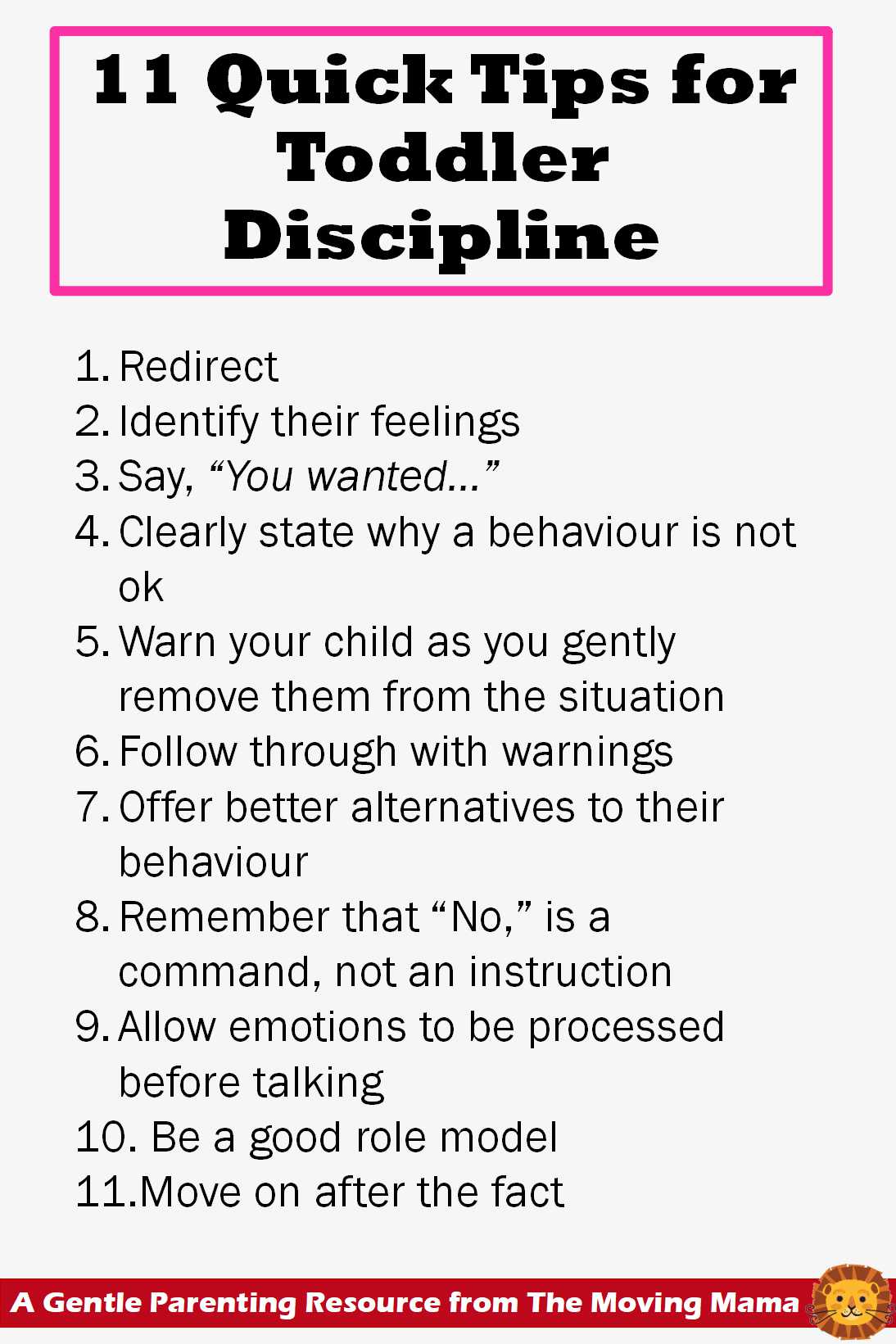
Quick Tips for Toddler Discipline
- Redirect
- Identify their feelings
- Say, “You wanted…”
- Clearly state why a behaviour is not ok
- Warn your child as you gently remove them from the situation
- Follow through with warnings
- Offer better alternatives to their behaviour
- Remember that “No,” is a command, not an instruction
- Allow emotions to be processed before talking
- Be a good role model
- Move on after the fact
Each of these techniques are covered in depth in the toddler post if you want more details on that. Save this image for future reference though to remind yourself of some simple strategies for discipline.
What Kind of Discipline Does a 3 Year Old Need?
By age 3 your child is likely still very curious about the world around them, highly emotional and they are testing the limits.
As parents, it is our responsibility to be firm and consistent with those limits so our child can thrive. We want to encourage their curiosity to explore, while also patiently teaching them how to regulate their emotions.
The last thing a child needs when it comes to disciplined is to be controlled. When our goal for our child is that they would have a heartfelt willingness to do what’s good, we have to let go of the control and guide them to make the right decisions on their own.
When we patiently teach them what the right decisions are and how to make them, over time our children will choose to do the right thing instead of feeling like they are forced.
Being forced to do something once might get the job done in that one instance, but to learn to do something over and over again as years go by takes a willingness from the individual. That’s why I recommend modeling and guiding the behaviour we want to see in our children, by giving them control they are not only practicing doing the thing we want them to do, but they are practicing to make the right decision on their own. That’s what we really want to see in them.
3 year old’s need discipline that is consistent, but also patient and firm.
They need gentle reminders, big hugs, clear instructions, the time to do it right, and forgiveness when they make mistakes.
As their parents we have the power to give this to them, and to the best of our ability we should. If we are able to regulate and control our emotions, words and actions it will help our children to learn to control their’s.
Loving, patience is one of the most important things our children need from us, and when we can give that to them it makes the world of a difference. If that is an area you struggle with I have two posts you might find helpful – 6 Steps to Stop Being an Angry Mom and The #1 Thing for Amazing Parenting: Self Care for Moms.
Why 3 Year Old’s Misbehave
As I said already, 3 year old’s are still very emotional little humans. The right side of the brain (emotional side) is usually leading the way, which is why for the past few years maybe it seems like your child has been on an emotional rollercoaster.
As they get older the left side of the brain, the logical side, will get to lead the way during regular times, but for now they’re still leaning slightly to the emotional side and can easily slip right over.
At 3 years old some of the behaviour issues you might be facing could be…
- Tantrums
- Stubbornness
- Defiance, not listening
- Aggression to get what they want
- More
I’m sure you already know at this point which behaviours your 3 year old is most susceptible to and which ones you have the hardest time dealing with.
At 3 years old a child is still trying to gain a sense of independence in this world and their behaviour can still seem very selfish. Things like taking turns can be a difficult concept to learn, something that big kids can understand but might still be hard for a 3 year old to wrap their mind around.
When we try to force littles ones to follow these social expectations it can be hard for them. We are better off to gently navigate the situations at this young age with the confidence that as they get older and more developed they will be able to reasonably understand things like taking turns and sharing.
3 year old’s misbehave often because they live in a world that wasn’t designed for them. They get frustrated that they can’t always do what they want (because it’s not safe, or because it’s time for something else, etc.). They get overstimulated by a busy day of errands. They get upset when they can’t keep up or reach what they want.
It would be a frustrating world to live in, and often times what they want and what they can have don’t line up, and their young minds still have a hard time understanding the WHY. “We don’t have enough money to buy that toy,” or “You can’t go outside without your boots or you will get wet and cold,” are logical explanations that a 4 year old could accept but a 3 year old will struggle with.
When I think of toddlers and misbehaviour I really just see it as them trying to figure this world out, and even with older children too. They growing up and learning what’s ok and what’s not, how things work. Our patience and consistency will help them to quickly learn the ins and outs of this world and to make good choices.
The Basics of Discipline
Below I will share some specific tricks you can use for disciplining a 3 year old, but in general this is the guide we follow with discipline.
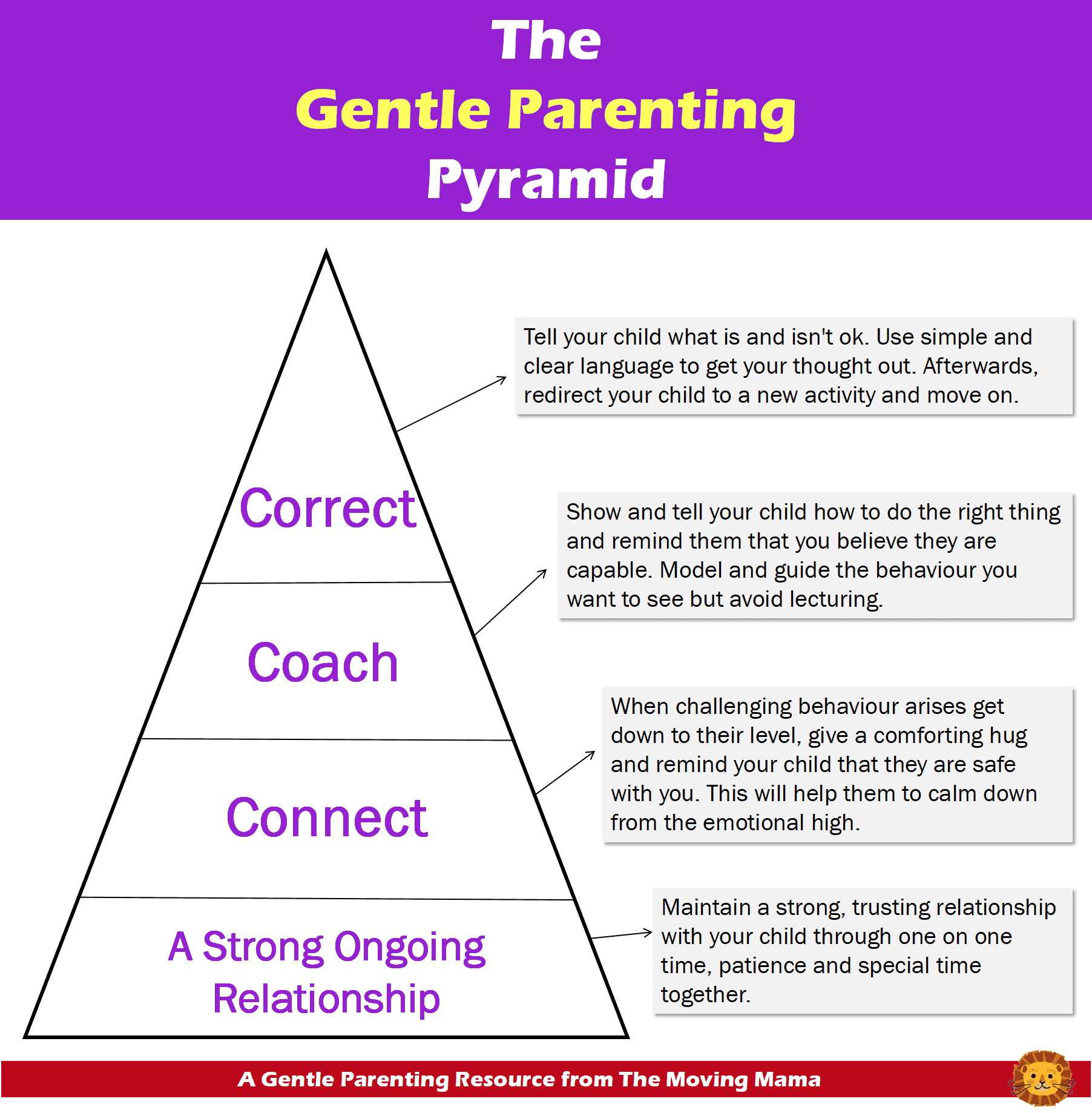
A Strong Ongoing Relationship
We keep a strong, ongoing relationship with our child as a preventative measure all the time. Value your relationship and the trust that is built between the two of you by being consistent, trustworthy and loving. Avoid making threats or sending them to be in a time out all alone, consistently stay close and show your child that they are safe with you.
Connect
Then in a misbehaviour scenario start with connection, get down to their eye level and express comfort through physical touch, facial expression and the tone of your voice. When children are very emotional and the right side of their brain is running the show they might not be able to rationally interpret your words, but they can read body language and facial expression very well. By connecting with your child and providing the necessary comfort it will really help them to calm down. The right side of their brain will relax too and they will be able to see things a bit more clearly.
Coach
Then you can coach your child, show them a better way to handle that situation. Use positive words and really try to see yourself as their coach. You’re not their enemy or their judge, you are their coach who wants to help them to do it the right way.
Correct
If necessary, make a clear correction of their behaviour. You can say something like, “Hitting hurts people.” Try to keep your language simple to clearly state what isn’t ok. Try to avoid the temptation of lecturing or trying to reiterate a point. The simpler your words are the easier it will be for your child to really hear you and to take that message to heart.
Easy Strategies for Disciplining a 3 Year Old
Describe what you see
Try instead of telling your toddler, “do this” and “do that” to describe what you see. Try saying, “Your socks are on the floor.” Give it a moment and maybe they will pick them up, if not you can try saying, “Dirty socks belong in the laundry basket.” You’re giving your 3 year old a chance to learn to also identify a problem and to solve it. You could ask them to pick them up after that if you wanted, or you could say, “I’m going to pick them up now and put them in the laundry basket.”
Ask questions to provoke them to make the right decision without forcing
Lecturing might seem like the easy way to get a child to do what you want them to, but we are not just working with their actions we also want to work on their thought process.
With the sock example, you could also add asking questions like, “Are these your socks?” “Where should we put our dirty socks?”
By asking the questions and making your child think through the answer you’re not just telling them what to do, but you’re helping them to learn to come to that conclusion on their own.
Turn things into games
Not every moment together for discipline has to be serious. If your child is showing defiance in a certain area all the time try turning it into a game to make it more fun for them. You could race to the parking lot after playing to the park, or pretend the toy box is a hungry hippo eating all the toys. Try to make things a little bit fun and invite your child to cooperate rather than demanding obedience.
Warn them to changes in the routine
As I said, this crazy world can be overwhelming for little children. If your daily routine is going to be a bit different be sure to give your child a heads up. Whether it be that you’re going somewhere right after breakfast, or maybe that grandma will only be able to visit for a short time today, be sure to warn them of any changes.
If your child cries during an activity that is different than usual try to empathize with the feeling of chaos they are probably going through. Offer your comfort, which is consistent to them and will help them to feel relaxed and a bit of a sense of normalcy.
Focus on positive areas of their behaviour
Appreciate what your child does that you want to see more of. Even if it wasn’t 100% perfect, let them know what they did that was right and focus on that. Maybe your child opened a drawer and someone’s house and you said, “Please close the drawer and come here.” Maybe it took them a couple seconds and they were actually about to reach their hand in…but then they closed it and came to you.
Try to see that as a win and appreciate your child for it. You can say something like, “I really like how you closed the drawer even though you wanted to take something out.” “It was really great how you listened to me.”
This positive encouragement will go a long way, and try to really make the encouragement about what you specifically see so they know exactly what it is that they did right.
Remember to always stay patient
Disciplining a 3 year old with love and patience can be tricky business. It can be hard to be consistent and to have to repeat ourselves over and over again. It can be frustrating even to feel like we’re being ignored. But our children need us to be patient with them as they learn how to navigate through this world.
I always try to see things through the child’s point of view, which helps to guide me on how to treat them in that moment. I try to remember to approach them with respect while also remembering that in the long run I want them to learn to do the right thing, even if they can’t figure it out completely today.
Staying focused on your long term goal for your child will make discipline easier.
If you would like more information about using these Gentle Parenting strategies in your home so you can become a natural when it comes to positive discipline, be sure to sign up below for my free email course. It will teach you the very basics you need to know that can be applied to children at any age.
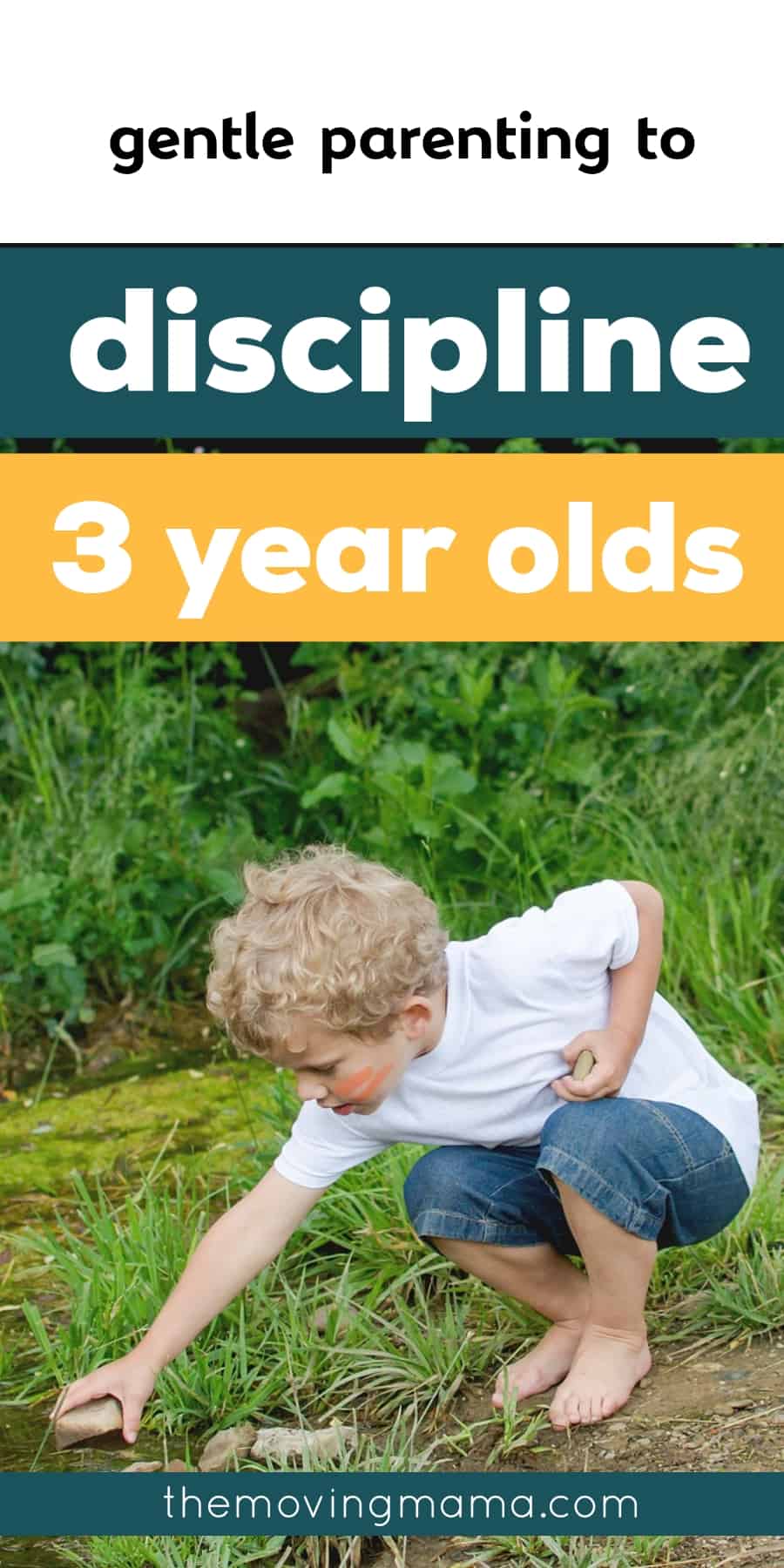

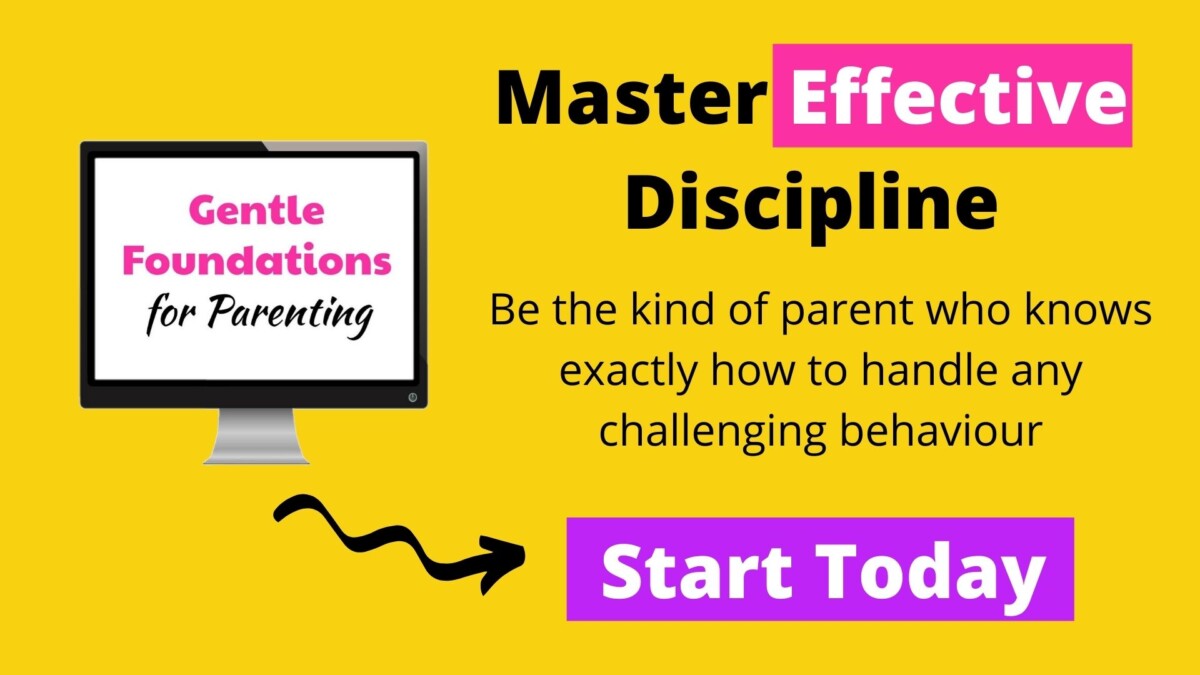
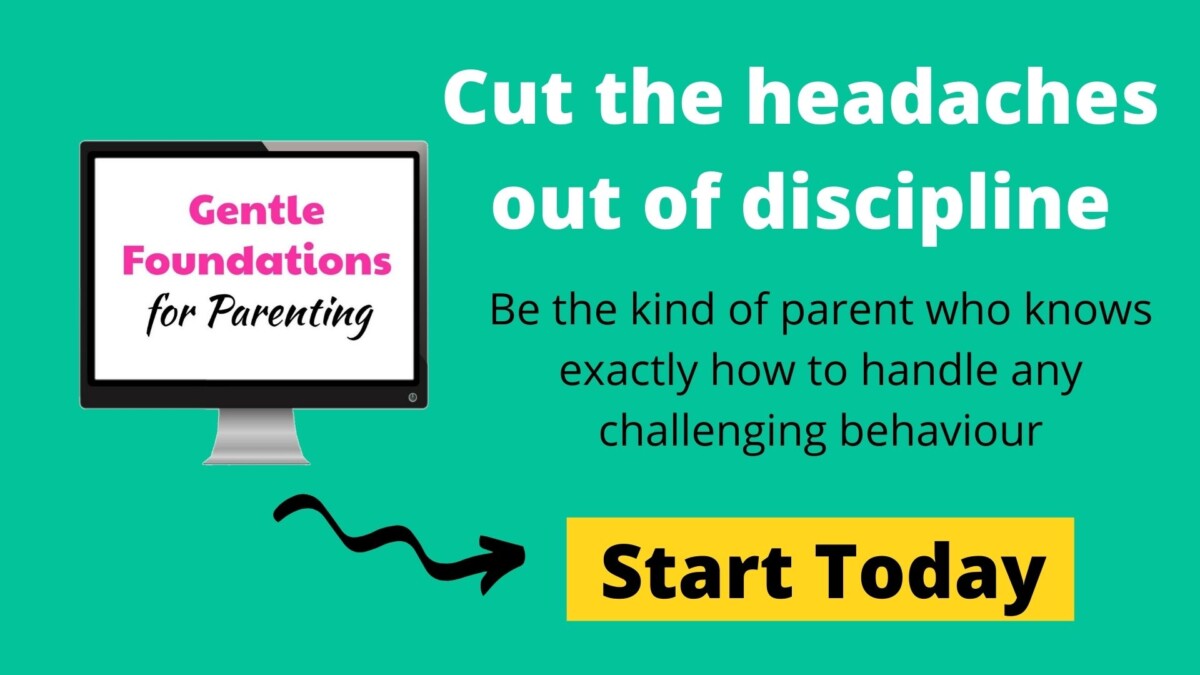
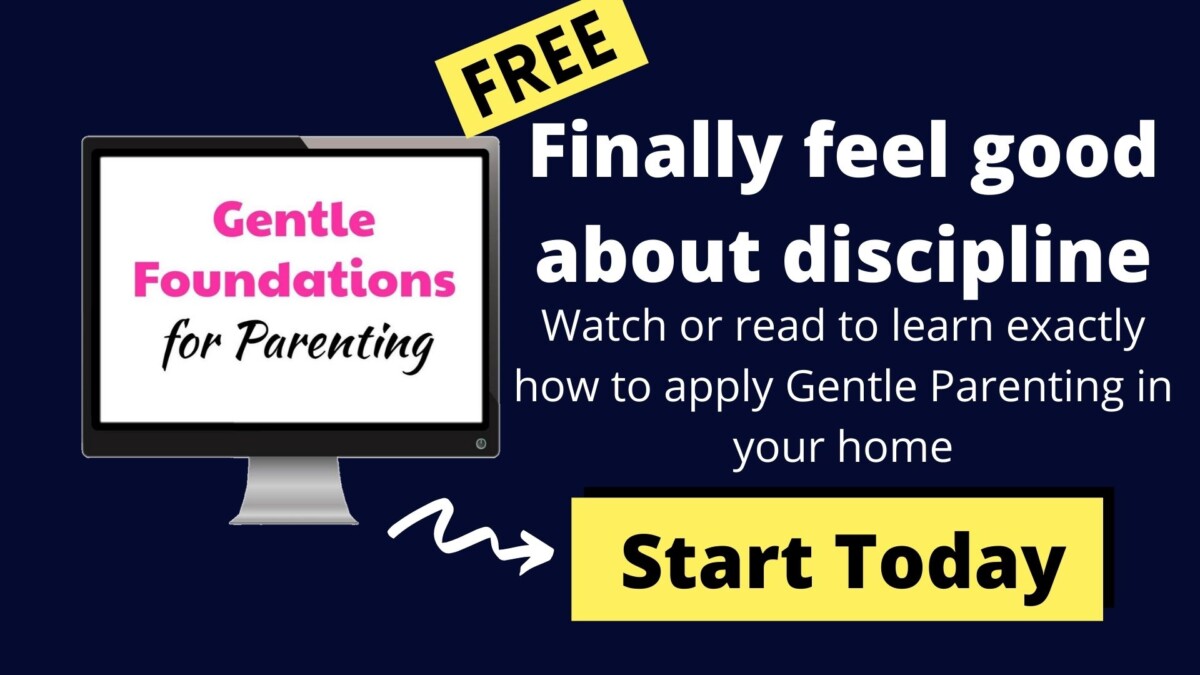
Informative piece of content, parents need to maintain calm environment in house. Engaging them with sports or music class at early stage will help children to concentrate and grow skills. Thanks for sharing
Marygris1545@gmail.com .I hope more parents read this. I love it 😀